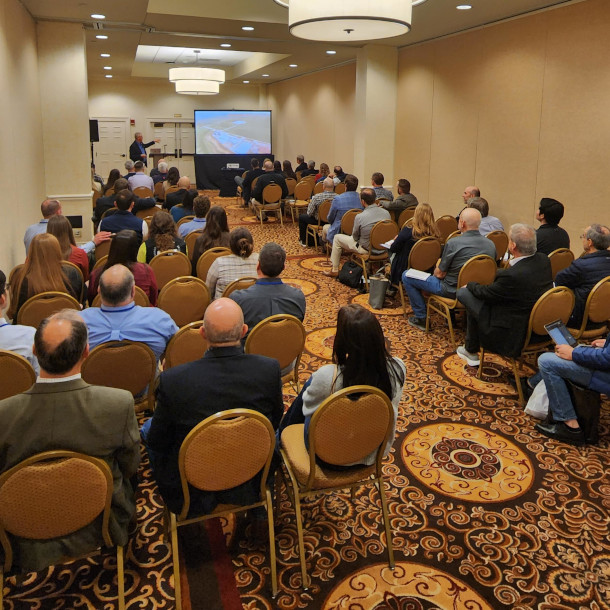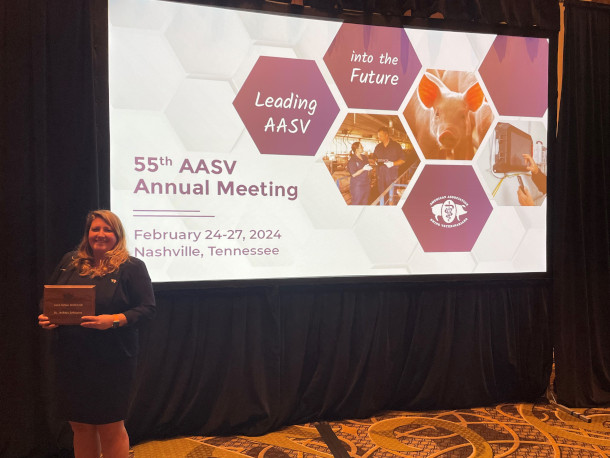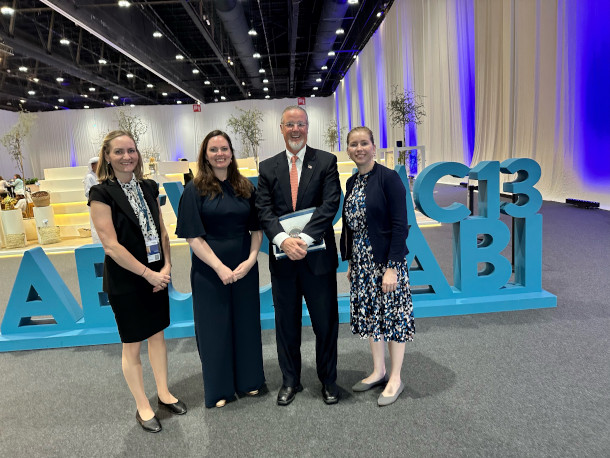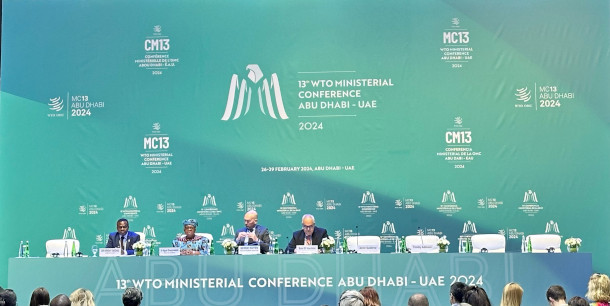Capital Update – For the Week Ending March 1, 2024
In this week’s National Pork Producers Council (NPPC) Friday recap: NPPC commends packing plant line speeds extension; NPPC shines at AASV annual meeting; Vilsack again urges Congress to fix California Proposition 12; NPPC’s Zieba elevates global agriculture trade discussions at WTO Ministerial meeting; NPPC’s Formica participates in food policy discussion; and NPPC applauds Senate confirmation of CFTC’s Mersinger. Take a deeper dive below.
NPPC commends packing plant line speeds extension | NPPC shines at AASV annual meeting | Vilsack again urges Congress to fix California Proposition 12 | NPPC’s Zieba elevates global agriculture trade discussions at WTO Ministerial meeting | NPPC’s Formica participates in food policy discussion | NPPC applauds Senate confirmation of CFTC’s Mersinger
NPPC Commends Packing Plant Line Speeds Extension
What happened: The U.S. Department of Agriculture’s Food Safety and Inspection Service (FSIS) announced it will again extend time-limited trials at six pork packing plants operating with faster harvest line speeds. The latest extension runs through Jan. 15, 2025.
USDA in late 2019 established the New Swine Inspection System (NSIS), allowing packing plants to determine their own line speeds based on their ability to maintain process controls. A U.S. District Court in March 2021 vacated the provision, citing a lack of safety data. FSIS in November 2021 implemented a time-limited trial for six NSIS facilities to use increased line speeds for one year while collecting data for evaluating the impact of the faster speeds on workers. The trial period was previously extended twice, including 90 days in late November 2023.
NPPC’s take: NPPC supports extension of — and making permanent — the NSIS line speeds program, which could increase packing capacity and alleviate supply issues.
Why it matters: Without the faster line speeds, packers would see a decrease in packing capacity, which could lead to a drop in pork prices.
NPPC Shines at AASV Annual Meeting
What happened: NPPC board member Rob Brenneman and staffers Drs. Anna Forseth and Ashley Johnson presented at the annual meeting of the American Association of Swine Veterinarians (AASV) in Nashville, Tennessee.
Brenneman, a pork producer from Washington, Iowa, gave a producer’s perspective on dealing with adversity, noting 2023 was a challenging year, with producers losing on average $30-$40 per hog marketed.
Forseth, NPPC’s director of animal health, talked about the pork industry’s need for a more robust traceability system to deal with foreign animal diseases (FADs) and the U.S. Customs and Border Protection’s efforts, including the use of detector dogs at ports of entry, to keep FADs out of the country.
Johnson, NPPC’s director of food policy, discussed the role of veterinarians in the regulation of animal health products, including weighing in through public comments on proposed rules, such as those affecting antimicrobials and other animal drugs.
Johnson was awarded the $10,000 Hogg Scholarship, named after long-time veterinarian Dr. Alex Hogg. This scholarship is offered to swine veterinarians seeking a master’s or higher degree in a field related to swine health and production.
Also, at the meeting, the AASV Pharmaceutical Issues Committee approved monitoring the development and use of biologics, including mRNA vaccines, in veterinary medicine, a priority advocated for by NPPC.
Why it matters: AASV, which has about 1,300 members in more than 40 countries, works to increase the knowledge of swine veterinarians, protect and promote the health and well-being of pigs, and advocate for science-based approaches to veterinary, industry, and public health issues.

NPPC board member and Iowa pork producer Rob Brenneman presents at the AASV annual meeting.
Dr. Johnson received the Hogg scholarship to pursue a master’s degree in food safety from Michigan State University.

Vilsack Again Urges Congress to Fix California Proposition 12
What happened: Agriculture Secretary Tom Vilsack testified on U.S. Department of Agriculture’s programs before the Senate Committee on Agriculture, Nutrition, and Forestry. He amplified his plea to Congress to deal with the consequences of California Proposition 12, which bans in California the sale of pork, veal, and eggs from animals raised anywhere in housing that fails to meet the state’s arbitrary farm production standards.
“When you’re dealing with 12% of the pork market in one state, there is not a choice between doing business in California and not in California,” Vilsack told the panel. “It’s going to be driven by that [Prop. 12] requirement.
“At some point in time, somebody’s got to provide some degree of consistency and clarity otherwise you’re just inviting 50 different states to do 50 different iterations of [Prop. 12]. Farmers don’t need the chaos; they need clarity and certainty.”
In his Feb. 14 testimony to the House Agriculture Committee, Vilsack said there will be “chaos in the marketplace” unless Congress addresses Prop. 12.
NPPC’s take: NPPC, which has fought against Prop. 12 for the past five years, is working with Congress on a solution to the problems created by the law. It supports adding a provision to the next Farm Bill to address Prop. 12 issues.
Why it matters: Pork producers across the country must comply with Prop. 12 or forgo selling into the California market of 40 million people who consume nearly 15% of all pork sold domestically. Most producers, particularly smaller ones, cannot afford the hundreds of thousands of dollars it would cost to retrofit existing or build new housing that complies with Prop. 12. The negative effects of Prop. 12 would be compounded if other states were to adopt similar restrictive laws and regulations.
NPPC’s Zieba Elevates Global Agriculture Trade Discussions at WTO Ministerial Meeting
What happened: NPPC Vice President of International Affairs Maria C. Zieba attended the 13th Ministerial Conference of the World Trade Organization in Abu Dhabi, United Arab Emirates.
Attendees at the conference, the WTO’s top decision-making body, reviewed the functioning of the multilateral trading system and discussed the future work of the organization.
Zieba met with representatives from foreign governments and U.S. business and government officials, pressing the latter to work for market access through WTO as well as to push for reforms to the international trading system. Meetings with U.S. government trade negotiators included private status briefings on negotiations and texts.
NPPC’s take: The U.S. pork industry is dependent on exports, and NPPC is continually fighting for increased market access. Ahead of the meeting, NPPC joined a coalition of agricultural organizations in emphasizing the need for a proposal on market access and discussions on restoring binding dispute settlement mechanisms to enforce international trade rules.
Why it matters: Comprised of 164 member countries, the WTO deals with the rules of trade between nations to ensure trade flows as smoothly and predictably as possible.

Left to right: U.S. Trade Representative WTO Ag Negotiator Erin Nicholson, CropLife America Federal Government Relations Director Molly O’Connor, U.S. Ag Ambassador Doug McKalip, and NPPC Vice President of International Affairs Maria C. Zieba.
Panelists at the 13th WTO Ministerial Conference.

NPPC’s Formica Participates in Food Policy Discussion
What happened: NPPC Chief Legal Strategist Michael Formica participated in a legal and technical panel discussion on navigating conflicting state and federal legislative requirements, as well as the significant impacts created for the food supply chain, at the Institute of Food Technologists and American Society for Nutrition’s annual Food Policy Impact conference.
Formica spoke about the problems posed by California Proposition 12 and Massachusetts Question 3, which ban the sale of pork, veal, and eggs from animals raised anywhere that don’t meet those states’ farm production standards, as well as the challenges facing the pork industry.
Why it matters: NPPC and other livestock groups are concerned that without federal action, producers could face a patchwork of 50 state farm production regulations. They are urging Congress to address the issues — increases in production costs and decreases in productivity — caused by the California and Massachusetts initiatives and preempt other states from imposing standards beyond their borders.
NPPC Applauds Senate Confirmation of CFTC’s Mersinger
What happened: NPPC applauded U.S. Senate confirmation of Summer Mersinger to the Commodity Futures Trading Commission (CFTC), for a term that runs until April 2028.
In a letter to Senate Committee on Agriculture, Nutrition, and Forestry Chairwoman Debbie Stabenow (D-MI) and Ranking Member John Boozman (R-AR), NPPC joined 15 agricultural organizations in saying, “If confirmed to another term, Commissioner Mersinger will strike the right balance in providing input to CFTC’s regulation and oversight of the commodity and financial markets.”
Why it matters: The CFTC oversees and helps safeguard the futures and swaps markets used by pork producers and other agricultural sectors to manage financial risk.